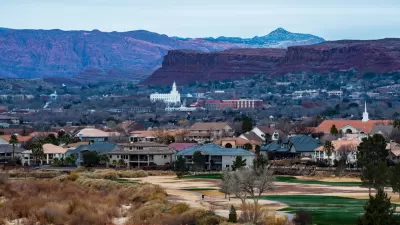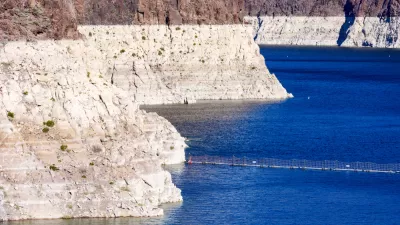Officials in the Coachella Valley seem reluctant to restrict water supplies to the many golf courses and ornamental lakes that dot the region, opting instead to cut water deliveries to a groundwater recharge facility.

When cities like Palm Springs first sprang up in the Southern California desert, the possibilities for growth seemed limitless. As Ian James explains in the Los Angeles Times, “The entrepreneurs and boosters who decades ago built the Coachella Valley’s reputation as a playground destination saw the appeal of developments awash in water, made possible by wells drawing on the aquifer and a steady stream of Colorado River water.”
But with the Colorado River at record low levels and groundwater supplies growing short, the region may need to shift its priorities. Sendy Hernández Orellana Barrows, president of the CactusToClouds Institute, “believes becoming more climate-resilient will require making better use of water by prioritizing drinking water for communities and reducing consumption that isn’t vital.” Yet local leaders have opted to cut groundwater replenishment rather than put any restrictions on golf courses, farmland, or artificial lakes.
According to James, “the water district’s managers anticipate securing the bulk of the reductions by curtailing water deliveries to a groundwater replenishment facility in La Quinta, where Colorado River water pours into ponds and percolates into the soil to recharge the aquifer.” Cástulo Estrada, vice president of the water district’s board, calls the plan “the easiest way, the less disruptive way” to temporarily cut back on water use. Meanwhile, critics like Hernández Orellana say future sustainability “demands switching to much lower water use” from all sectors.
FULL STORY: Why desert golf courses and artificial lakes remain untouched by the Colorado River crisis

Alabama: Trump Terminates Settlements for Black Communities Harmed By Raw Sewage
Trump deemed the landmark civil rights agreement “illegal DEI and environmental justice policy.”

Study: Maui’s Plan to Convert Vacation Rentals to Long-Term Housing Could Cause Nearly $1 Billion Economic Loss
The plan would reduce visitor accommodation by 25% resulting in 1,900 jobs lost.

Planetizen Federal Action Tracker
A weekly monitor of how Trump’s orders and actions are impacting planners and planning in America.

Wind Energy on the Rise Despite Federal Policy Reversal
The Trump administration is revoking federal support for renewable energy, but demand for new projects continues unabated.

Passengers Flock to Caltrain After Electrification
The new electric trains are running faster and more reliably, leading to strong ridership growth on the Bay Area rail system.

Texas Churches Rally Behind ‘Yes in God’s Back Yard’ Legislation
Religious leaders want the state to reduce zoning regulations to streamline leasing church-owned land to housing developers.
Urban Design for Planners 1: Software Tools
This six-course series explores essential urban design concepts using open source software and equips planners with the tools they need to participate fully in the urban design process.
Planning for Universal Design
Learn the tools for implementing Universal Design in planning regulations.
Caltrans
Smith Gee Studio
Institute for Housing and Urban Development Studies (IHS)
City of Grandview
Harvard GSD Executive Education
Toledo-Lucas County Plan Commissions
Salt Lake City
NYU Wagner Graduate School of Public Service





























